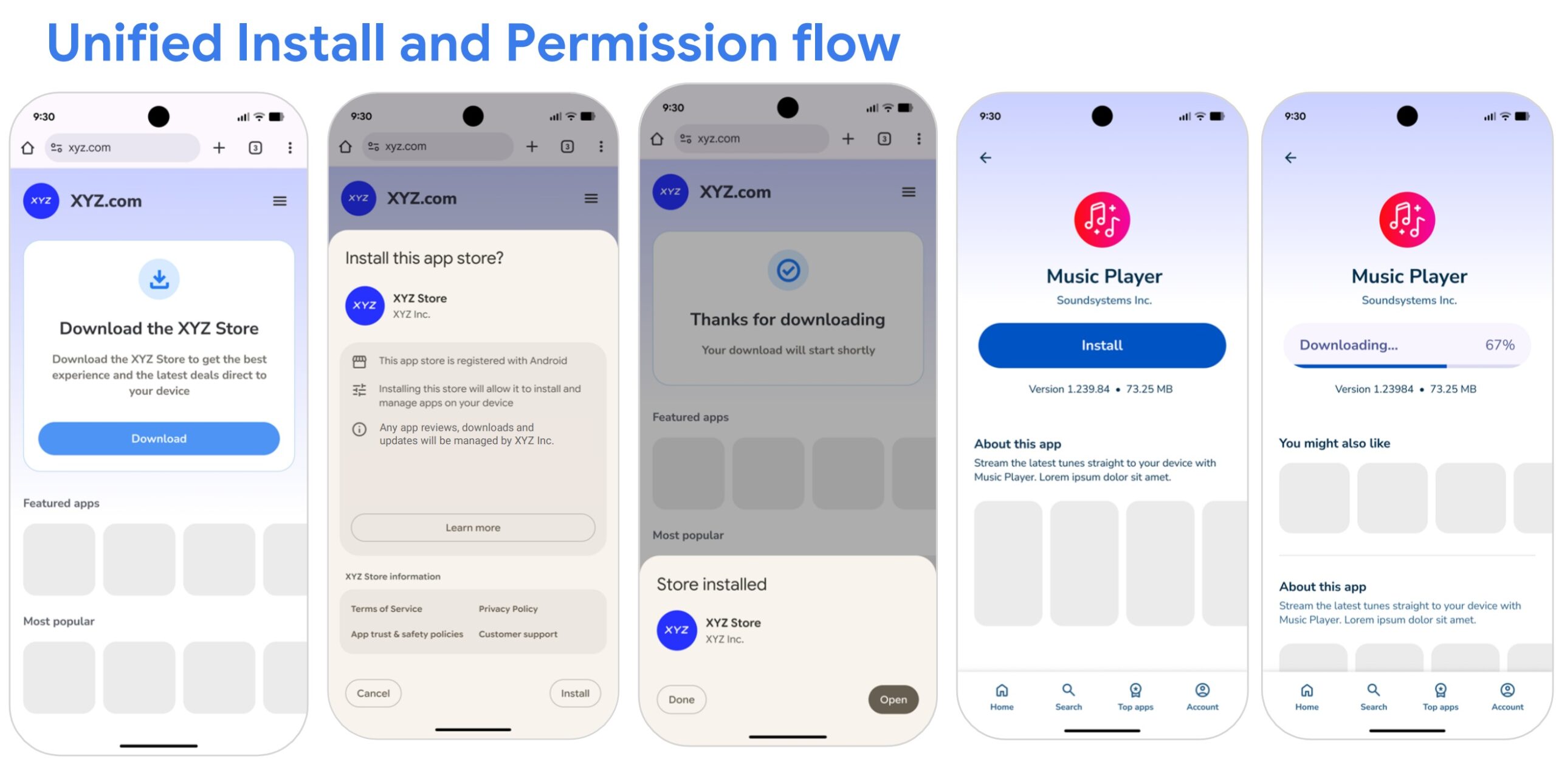Mishaal Rahman / Android Authority
TL;DR
- As part of a settlement with Epic, Google is introducing support for “Registered App Stores” starting with Android 17.
- Certified third-party stores will utilize a “single store install screen” that automatically grants permission to install other apps.
- The agreement also prohibits device manufacturers from adding extra warning screens or barriers to block these store installations, prohibits Epic from bringing its Game Store to the Play Store, and ends the mudslinging between Epic and Google.
A “Registered App Store” is a third-party app store that Google has certified as a legitimate platform for downloading Android apps. Any store that receives this certification will be eligible to use Android’s new “single store install screen” for installation. This new screen will use “neutral language” to inform users about the store they’re about to install and clarify which permissions it requires, such as the ability to install other apps.
While the court documents published last week lacked visuals, a new filing gives us our first look at the “single store install screen” coming in Android 17. It also provides fresh details on how the feature will work.
Don’t want to miss the best from Android Authority?


The image below details the proposed “Unified Install and Permission flow.” In this example, a user navigates to a platform’s website and taps a “Download” button. This action launches the install screen, which asks if the user wants to “install this app store.” The prompt clarifies that the store is “registered with Android” and that installing it grants the ability to “install and manage apps on your device.” It also notes that the alternative platform will handle app reviews and updates. Links to the platform’s Terms of Service, Privacy Policy, Trust & Safety policies, and customer support sit near the bottom, followed by buttons to cancel or proceed.
If the user chooses to install, they can tap “Done” to continue browsing or “Open” to launch the store immediately. Crucially, the newly installed store automatically gains permission to install other apps, saving users the step of manually enabling that setting.

To support these “Registered App Stores,” Google is working on core changes to the Android operating system. These changes will be ready “in a version of the next major Android release.” According to the document, Google could introduce these changes as early as the initial Android 17 release, but no later than Android 17 QPR2. This gives the company until the end of 2026 to implement the support.
Android OEMs must make it easier to install third-party app stores, too
Typically, OEMs are free to impose their own restrictions on sideloading. Some have introduced extra warning screens that users must acknowledge before they can sideload apps. To ensure uniformity, Google agreed to new requirements prohibiting OEMs from complicating the “single screen install flow.”
Specifically:
“Google will prohibit, through contracts, the device certification process or otherwise, the introduction of more burdensome Android installation flows for Registered App Stores than, or subject them to obligations in addition to, those set forth in Exhibit 1.”
Epic Games Store won’t be coming to the Play Store after all
Following Google’s loss in the Epic v. Google lawsuit, the court initially proposed mandates to break Google’s monopoly, including a requirement to host rival app stores within the Google Play Store. Consequently, Epic CEO Tim Sweeney announced in July that his company would bring the Epic Games Store to Android’s official marketplace.

Under the new settlement terms, however, Google is no longer required to distribute rival app stores. The document explicitly states that Epic will not have the option to list its Games Store on Google Play. However, it does leave the door open for Epic to list Fortnite, or any of its other individual games, on the Play Store.
“Google shall immediately reinstate Epic’s developer account. Epic and its subsidiaries shall have the option to list or relist any of their respective games and other applications on the Google Play store (including Fortnite, but not the Epic Games Store).”
The mud-slinging between Epic and Google is over
The settlement terms also dictate a ceasefire between the two companies. In short, the mud-slinging is over. Moving forward, neither party will disparage the other regarding business practices covered in their legal battles.
In fact, Epic now concedes that, under the new terms, “Google and [the] Android platform…are procompetitive and a model for app store / platform operations, and will make good faith efforts to advocate for the same.” However, Epic reserves the right to advocate for legislation proposed by third parties aiming to open up closed mobile ecosystems — provided it “directs its advocacy specifically to Apple practices.” Basically, Epic is shifting its sights entirely to the Apple App Store.
The new court document reveals other details about the terms of Epic and Google’s settlement, but in our view, these were the most interesting tidbits. Unfortunately, parts of the document were redacted, so there may be some salacious details we’re missing out now. If more information arises, we’ll be sure to let you all know.
Thanks to LaNonymous on Discord for the tip!
Thank you for being part of our community. Read our Comment Policy before posting.




